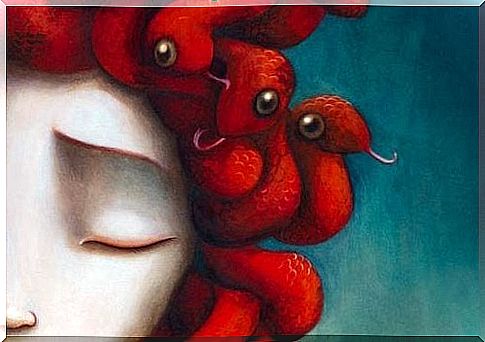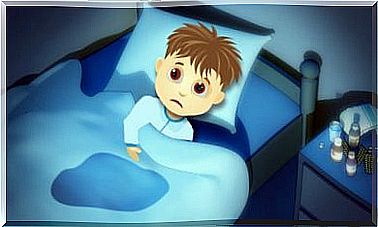Dysthymia – Hidden Depression And Its Dangers

Sometimes a voice appears in our minds that whispers to us that we need to feel guilty. This voice tells us that we are only making mistakes and that it is not worth moving on. This psychological problem is known as “dysthymia” or hidden depression.
Its symptoms are chronic discomfort, bad mood and lack of interest in daily life. People who suffer from dysthymia show apathy and reduced energy for any challenge that comes their way.
Dysthymia is a form of depression that, in its early stages, can be mild or moderate. If left untreated, dysthymia can cause complications. For this reason, it is essential to know the characteristic symptoms of this disease.
Depending on how they affect your life and the control you exercise over them, guilt and bad mood could signal the presence of depression. But these symptoms can also signal the fact that you are going through a more difficult period.
When guilt and sadness invade your life
Let’s start by analyzing some concrete examples. For example, when an object in your house gets dirty and you don’t feel like cleaning it right away, most of the time you start to feel guilty.
Also, when you eat a little more than you should or say to someone some words that you later regret, you start to feel bad. Again, you have a sense of guilt. Sometimes, when you look in the mirror, you may see nothing more than a lost person.
All these negative emotions, taken together and experienced daily for months, are an alarm signal that something is wrong with you. It is not normal to live every moment chased by guilt.

Freud said that “exaggerated guilt and self-blame are key to understanding depression.” Nowadays, with the help of magnetic resonance imaging, we have managed to discover the effects of these negative emotions on the brain.
Guilt and self-blame are harmful to the brain
A study on the effects of guilt on the brain was published in the journal General Psychiatry (General Psychiatry). Here is what the researchers discovered:
- The structure of the brain responsible for processing the behavior of rationalizing and remedying the feeling of guilt is located in the anterior temporal lobe. This region of the brain controls social behavior and allows us to look at things objectively.
- The brain of people suffering from depressive disorders such as dysthymia has been “disconnected” from the anterior pole of the temporal lobe, activating exclusively the subgenual region.
- For this reason, they will be unable to blame someone else for the negative experiences in their lives (for example, when someone upsets or deceives them). For these individuals, all the evils that come their way will always have their cause in their own behavior.
It is clear that we are dealing with a distortion of reality, whose origin is in the brain.
According to experts, if hidden depression is not treated properly, the patient may experience aggression and low self-esteem. In the worst cases, he will feel that he has lost control of his life and that there is no point in trying to move on. Dysthymia can have a devastating effect on us.
When low moods become daily companions
Hidden depression or dysthymia have as characteristic symptoms bad mood and the feeling that nothing in life has any charm.
- Apathy, lack of energy, sleep disorders, eating disorders, the oscillation between the desire to isolate yourself and the sudden need to be understood and cared for by others… All these are classic symptoms of this form of depression. Hidden depression can also have a genetic component.
Dysthymia is a complicated disease. The affected person can live for years feeling somewhat able to function in society. If you suffer from this type of depression, it does not mean that you will not be able to go to work every day or take care of your home and family.
But you will do all these things feeling completely indifferent and you will know clearly that you are not really happy. Gradually, it will be harder and harder for you to get out of bed in the morning.

It is essential to be aware that you have a problem and ask for help.
Strategies to deal with hidden depression every day
To defeat dysthymia you need medication, a psychologist, a lot of will and support from your loved ones. Every individual affected by this disease must find the most appropriate strategy for himself.
We are all unique, which is why we each experience dysthymia differently. But do not hesitate to apply the following simple tips every day, so as to improve your mood:

- Exercise, exercise, tanning and any other activity that involves leaving the house and surrounding yourself with “life”. Move your body to heal your brain.
- Try to give up the negative thoughts that haunt you. Get rid of the noises in your mind, all those lines like “I can’t” or “I’m guilty.”
- Remember that your negative thoughts are not synonymous with reality. They are simple perceptions, and perceptions can be wrong.
- View the changes you want to make each day. Imagine what your life would be like if you had a happier mood, if you were more balanced and gained inner peace.
Fight to make your dreams come true!









